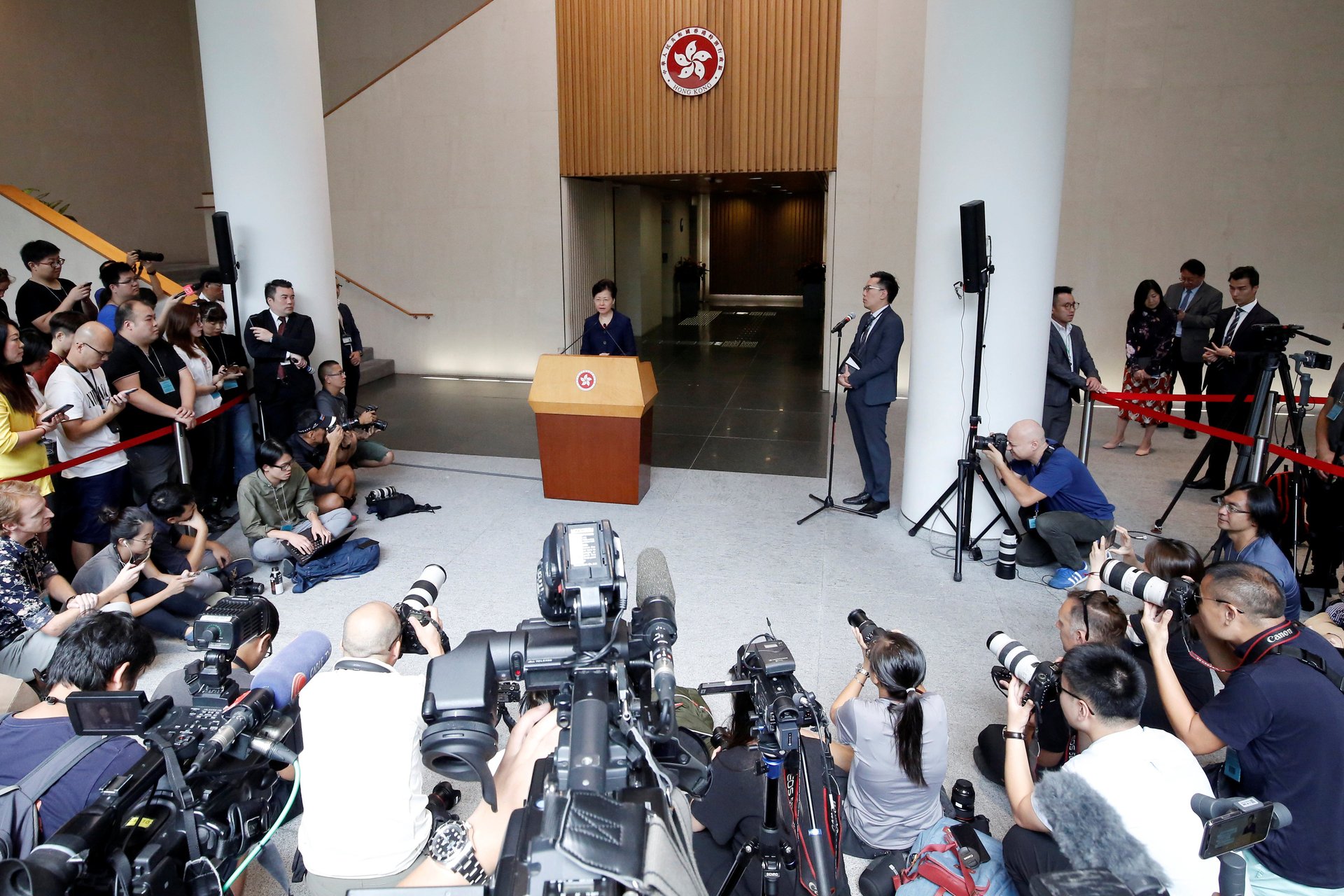Hong Kong’s moment of calm is in danger of being squandered
Hong Kong got a rare moment of calm this past weekend, when not a single canister of tear gas was fired—a rarity in a city where the use of the chemical has quickly become normalized over the past 11 weeks of protests. But it may not know what to do with it.


Hong Kong got a rare moment of calm this past weekend, when not a single canister of tear gas was fired—a rarity in a city where the use of the chemical has quickly become normalized over the past 11 weeks of protests. But it may not know what to do with it.
Some 1.7 million people marched peacefully on the city’s streets this past Sunday (Aug. 18) in a massive show of solidarity and continued dissatisfaction with the government, as they insisted their demands—including the full withdrawal of an extradition bill, and the establishment of an independent investigation into police conduct—be met. Protesters dispersed earlier than usual after a week that saw several demonstrators make public apologies for the beating of two men at the airport last Tuesday (Aug. 13).
Yet the temporary respite from clashes that escalated steadily in July risks being thrown into the wind as the city’s leader, Carrie Lam, stood steadfast in refusing to make any concrete form of concession to the protest’s key demands.
Addressing the media this morning (Aug. 20), chief executive Carrie Lam pledged to set up a “platform for dialogue” with local communities, but offered no immediate details. She also insisted in her prepared remarks that there would be no independent investigation into police actions. Instead, she repeated that the existing Independent Police Complaints Council (IPCC) that began an inquiry last month (pdf) was capable of investigating alleged police misconduct—but did suggest some outside participants could be brought into the process.
For the protesters, this is likely a huge slap in the face. After a chaotic last week, protesters had pledged to keep demonstrations entirely peaceful this past weekend. Throughout the past months, there have been ongoing debates among protesters as to whether the “brave fighters” camp, who are on the frontlines and advocate more aggressive tactics, are more effective in putting pressure on the government than the so-called “peaceful, rational, non-violent” camp, who want to keep confrontations to a minimum.
To many, Sunday’s massive and entirely peaceful march was an acknowledgement from the “fighters” that they were willing to take a pause in pursuit of solidarity. Now, what many are likely to see as Lam’s tepid response may be taken as proof that more extreme protest tactics are still needed. After all, the most significant concession so far—the suspension of the hated extradition bills that sparked the mass protests in June—came after a day of street occupation and confrontations with police, and not after a peaceful demonstration a few days earlier.
“If the government continues to ignore people’s voices they will only force protesters to use other means, including some radical means, to do protests,” Bonnie Leung, vice-convenor of the Civil Human Rights Front, which organized the latest rally as well as many of the earlier ones, said on Sunday night.
On the online forum LIHKG, which has served as a kind of de facto central command center for protest actions throughout the summer, threads calling for an escalation in tactics in response to Lam’s remarks quickly gained traction.
“It’s you who taught us that peaceful protests don’t work,” read one post (link in Chinese), echoing a now-iconic slogan that was spray-painted on the walls of the legislative chamber when protesters stormed the building in early July. “Set hard deadlines, escalate on all sides!”
Local politicians had urged Lam to respond to protesters’ efforts to keep demonstrations calm this past weekend, by offering something specific as an act of good faith. Ahead of Lam’s remarks, the head of the police watchdog IPCC, Anthony Neoh, himself called for a “proper burial” of the extradition bill in the form of a full withdrawal as a reasonable concession to make. He also did not rule out setting up a commission of inquiry into police actions.
Ivan Choy, a senior lecturer in the department of government and public administration at the Chinese University of Hong Kong, said that Lam appeared to be delaying, rather than addressing, protester demands.
“What kind of communication? With whom? And to what effect?” asked Choy, referring to unanswered questions from Lam’s announcement on beginning a dialogue with Hong Kong’s people. “I don’t think the people will accept this, and that the crisis will cease.”